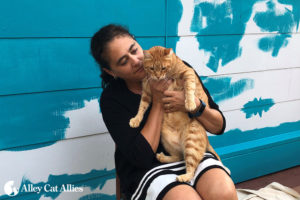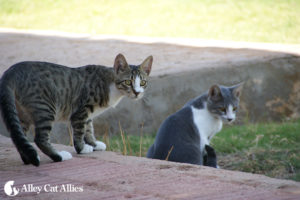Living on a multinational military camp in Egypt, foreign service officer Nadia Sbeih was on a missionbut not the kind of operation one might imagine. This one involved animals living at the camp. The camp commander wanted all the feral animals on the groundscats, dogs, and even ferretsremoved and killed. Sbeih stepped in to try to educate him about the importance of neutering and vaccinating the animals and returning them to their outdoor homes.
When that wasn’t proving successful, she tried another strategy: to find homes for the animals. Many had become socialized to people at the camp, and some people had become attached to the animals. During her two years in Egypt, Sbeih sent more than 25 animals to adoptive homes in the United States and Europe, sometimes partnering with international organizations to facilitate the U.S. soldiers in bringing them home and adopting them.

Nadia Sbeih poses with Gunk, the first cat she rescued in Egypt. Gunk got her name because she had an eye infection when Sbeih took her in.
Sbeih left Egypt in 2017 and is now based in Washington, D.C. She recently became a member of Alley Cat Allies’ Feral Friends Network. Despite moving every two years for her job, and getting accustomed to new cultures and attitudes, she’s found a way to work with veterinarians to spay and neuter animals in each place she’s lived and to help find them homes.
She’s faced unusual challenges but manages to accomplish her goals just the same. For example, the veterinarian she worked with in Equatorial Guinea had no clinic facilities. Spay and neuter surgeries were done on a dining room table.
“You just have to roll with it when you’re overseas,” says Sbeih.
Before she left Egypt, she took 27 cats from the compound where she lived to be spayed or neutered, and then returned them outdoors. She helped send an additional nine cats, including a three-legged feline and a one-eyed feline, and six puppies, to homes in the United States and Europe. By working with international organizations, she helped send seven dogs home with soldiers. Sbeih also brought home five cats of her own when she returned from Egypt.
“I know there are animals in the United States, and there are animals here that need loving homes, but sometimes you meet an animal you get attached to and you want to make its life better,” she says.

Taz, pictured left, and his brother, Simon, are two cats from Egypt who Sbeih found homes for in the United States.
She began helping cats in 2006 when she worked in marine conservation in Hawaiibefore she joined the foreign service. She fed feral cats and socialized strays who were part of a Trap-Neuter-Return (TNR) program. Her background in conservation and biology fuels her compassion for animals.
“We have domination over so many species; it bothers me that we are systematically eliminating species,” says Sbeih. “We need to be a part of the solution. For me, part of the solution is [being] responsible [with spaying and neutering].”
Her career as a foreign service officer, which began in 2010, took her to countries where spaying and neutering weren’t common practices. In Colombia, Equatorial Guinea, and Egypt, she took many of these animals to be spayed or neutered and vaccinated, and spread the word to local communities about the importance of doing so. But in countries where attitudes about animals and sterilization are dramatically different from those in the United States, a unique set of obstacles emerged.
“Not every person in every country treats animals the way some Americans do,” says Sbeih. “Animals are not integrated into the family. They are beasts of burden; they have a purpose, that’s it.”
She’s found the best way to advocate for spaying and neutering is to connect with people on a personal level. She shows people photos of her animals or introduces them to an animal in person. She also encourages people to relate to animals as living creatures.
“It might not result in an immediate, wanted response, but at least it opens the door for a later conversation or sheds light on an idea they hadn’t thought about,” she says.
As a member of Alley Cat Allies’ Feral Friends Network, Sbeih hopes to continue to advocate for spaying and neutering and help people carry out TNRno matter where her career takes her.

